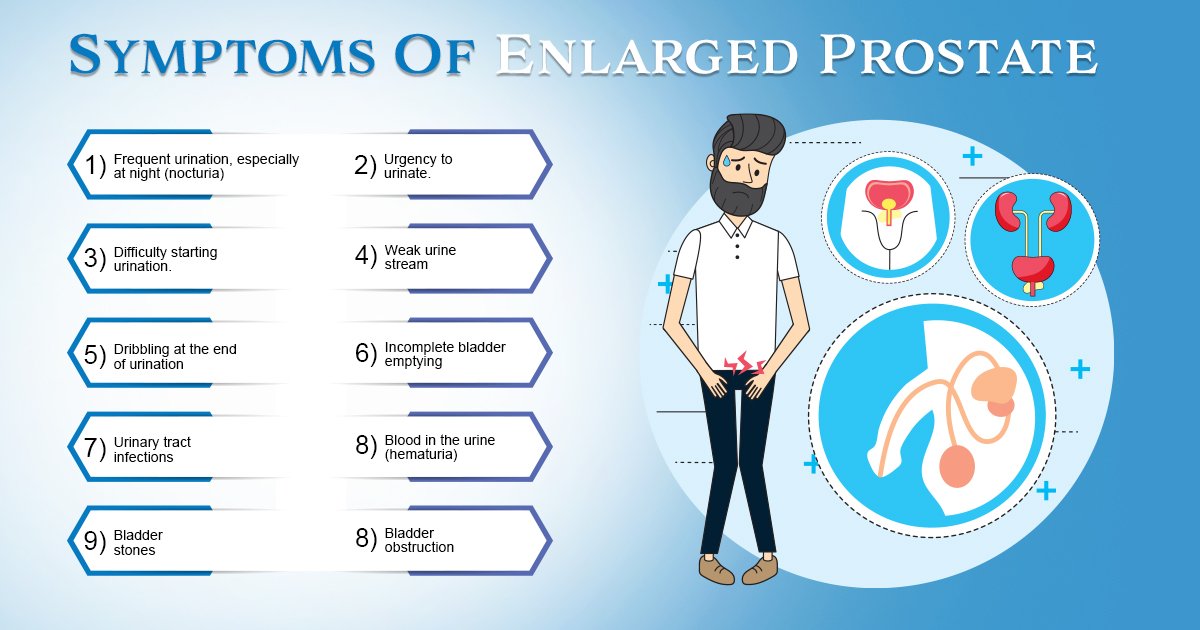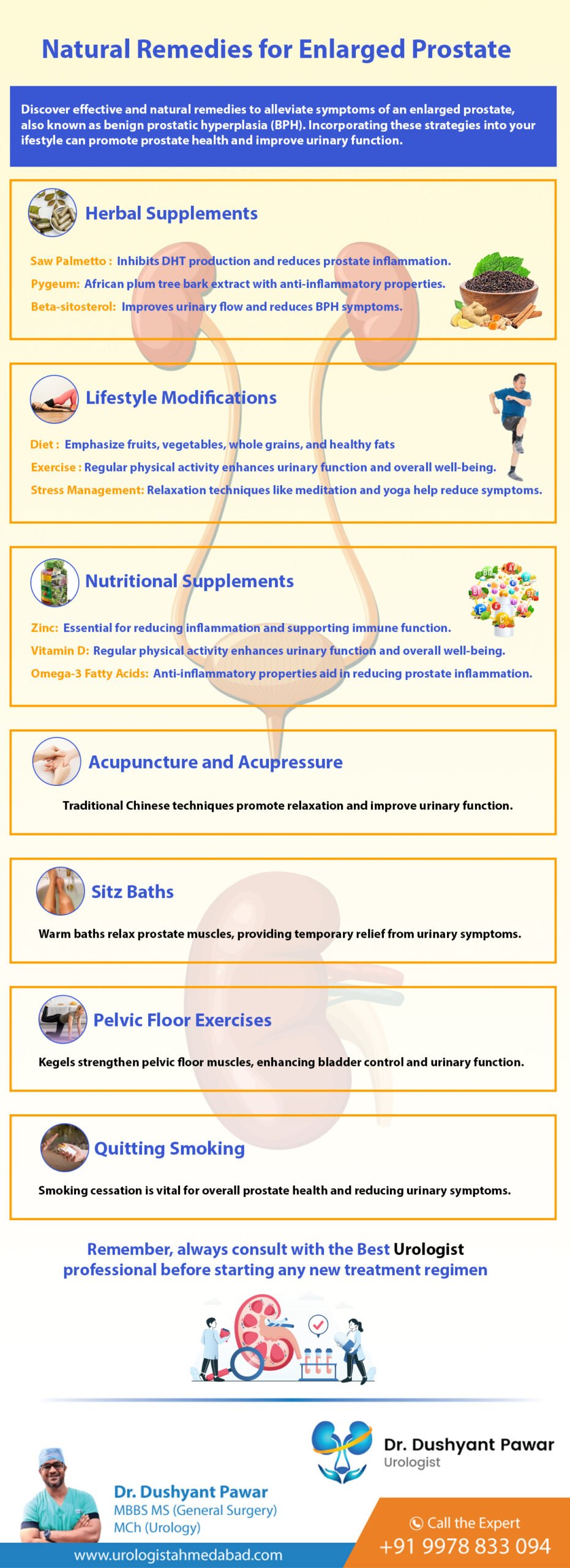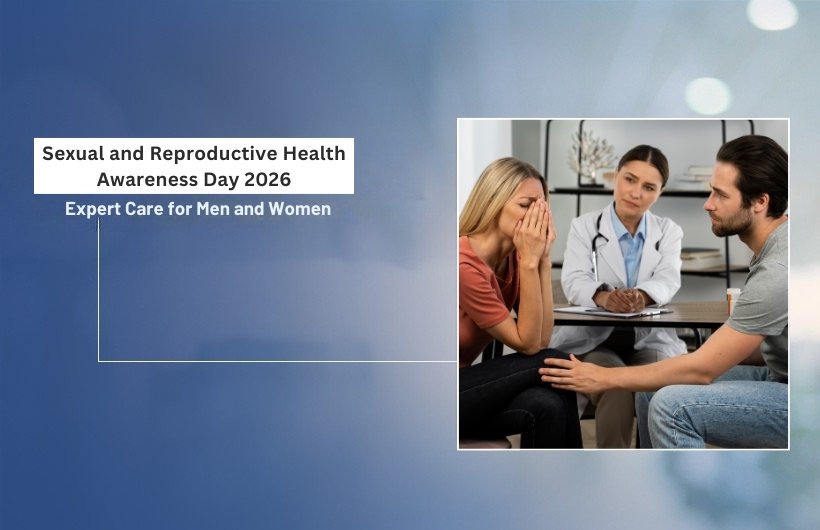Enlarged prostate, also known as benign prostatic hyperplasia (BPH), is a common condition among men, especially as they age. This condition can lead to various uncomfortable symptoms, such as frequent urination, difficulty starting or stopping urination, weak urine flow, and even urinary tract infections. While medication and surgery are options for managing BPH, many men seek natural remedies to alleviate their symptoms and improve their quality of life. In this blog, we’ll explore various natural remedies and lifestyle changes that can help manage an enlarged prostate effectively.
Table of Contents
What Causes Enlarged Prostate?
The prostate gland, which is part of the male reproductive system, tends to enlarge with age due to hormonal changes, particularly an increase in dihydrotestosterone (DHT), a hormone derived from testosterone. As the prostate enlarges, it can put pressure on the urethra, leading to the symptoms associated with BPH.
Symptoms Of Enlarged Prostate

- Frequent urination, especially at night (nocturia)
- Urgency to urinate.
- Difficulty starting urination.
- Weak urine stream
- Dribbling at the end of urination
- Incomplete bladder emptying
- Urinary tract infections
- Blood in the urine (hematuria)
- Bladder stones
- Bladder obstruction
These are the main symptoms of an enlarged prostate, which are important to acknowledge to get the appropriate and timely treatment of an enlarged prostate.
Best and Natural Remedies for Enlarged Prostate

-
Herbal Supplements:
- Saw Palmetto: This herb is commonly used to alleviate symptoms of BPH by inhibiting the production of DHT and reducing inflammation in the prostate.
- Pygeum: Extracted from the bark of the African plum tree, Pygeum has anti-inflammatory properties and has been shown to improve urinary symptoms associated with BPH.
- Beta-sitosterol: In plants like saw palmetto, beta-sitosterol can help improve urinary flow and reduce symptoms of BPH.
-
Lifestyle Modifications:
- Diet: Consuming a diet rich in fruits, vegetables, whole grains, and healthy fats can support prostate health. Avoiding caffeine, alcohol, and spicy foods may also help reduce urinary symptoms.
- Exercise: Regular physical activity, such as walking, swimming, or cycling, can improve urinary function and overall well-being.
- Stress Management: Stress can exacerbate BPH symptoms, so practicing relaxation techniques like meditation, deep breathing, or yoga can be beneficial.
-
Nutritional Supplements:
- Zinc: Adequate zinc levels are essential for prostate health, as this mineral plays a role in reducing inflammation and supporting immune function.
- Vitamin D: Research suggests that vitamin D deficiency may be linked to BPH, so ensuring sufficient vitamin D intake through sunlight exposure or supplements is crucial.
- Omega-3 Fatty Acids: Found in fish oil and flaxseed oil, omega-3 fatty acids have anti-inflammatory properties that may help reduce prostate inflammation.
-
Acupuncture and Acupressure:
- Traditional Chinese medicine techniques like acupuncture and acupressure have been shown to alleviate BPH symptoms by promoting relaxation and improving urinary function.
-
Sitz Baths:
- Warm sitz baths can help relax the muscles around the prostate and provide temporary relief from urinary symptoms.
-
Pelvic Floor Exercises:
- Strengthening the pelvic floor muscles through exercises like Kegels can improve bladder control and urinary function.
-
Quitting Smoking:
-
Medical Interventions for Enlarged Prostate
Medical interventions for enlarged prostate, or benign prostatic hyperplasia (BPH), are recommended for severe symptoms. These interventions include:
-
Prescription Medications:
- Alpha-blockers: Improve urinary flow by relaxing prostate and bladder muscles.
- 5-alpha reductase inhibitors: Shrink the prostate over time by reducing DHT production.
-
Minimally Invasive Procedures:
- Transurethral microwave therapy (TUMT): Uses microwave energy to destroy excess prostate tissue.
- Laser therapy: Removes obstructive tissue with lasers, improving urine flow.
-
Surgery:
- Transurethral resection of the prostate (TURP): Removes part of the prostate to relieve symptoms.
- Prostatectomy: Removes the entire prostate gland, often through minimally invasive methods.
These interventions aim to alleviate BPH symptoms and improve urinary function, but risks and benefits should be discussed with a healthcare provider before proceeding.
What are people’s preferences regarding natural remedies for prostate enlargement?
People’s preferences regarding natural remedies for prostate enlargement vary widely. Some individuals prefer natural remedies due to concerns about potential side effects associated with prescription medications or surgical interventions. They may also believe that natural remedies offer a more holistic approach to health and wellness.
Others may be skeptical of natural remedies and prefer conventional medical treatments that have been scientifically studied and proven to be effective. They may feel more comfortable relying on medications prescribed by healthcare professionals or undergoing surgical procedures recommended by urologists.
Factors influencing preferences for natural remedies may include cultural beliefs, personal experiences, access to healthcare, and individual attitudes toward alternative medicine. Additionally, some people may choose to integrate natural remedies alongside conventional treatments as part of a comprehensive approach to managing prostate enlargement symptoms.
Overall, the preferences regarding natural remedies for prostate enlargement are diverse and depend on individual beliefs, experiences, and health needs. Individuals need to consult with healthcare professionals to determine the most appropriate treatment approach based on their specific circumstances.
Diagnosis of Enlarged Prostate
Enlarged prostate, or benign prostatic hyperplasia (BPH), is typically diagnosed through:
- Medical History: Patients are asked about urinary symptoms, medications, and family history of prostate issues.
- Digital Rectal Exam (DRE): A physical exam where the doctor feels the size and texture of the prostate through the rectum.
- Urinalysis: A urine sample is analyzed for signs of infection or other urinary problems.
- Prostate-Specific Antigen (PSA) Test: Measures PSA levels in the blood, which can indicate prostate issues.
- Imaging Tests: Ultrasound, MRI, or CT scans may be done to assess prostate size and rule out other conditions.
Can an enlarged prostate occur in men of any age group?
Enlarged prostate, also known as benign prostatic hyperplasia (BPH), primarily affects men as they age. While it is more common in older men, it can occur in men of any age group, including younger adults. However, the prevalence and severity of BPH tend to increase with age.
In younger men, prostate enlargement is less common but can still occur due to factors such as:
- Hormonal Imbalance: Changes in hormone levels, particularly an increase in dihydrotestosterone (DHT), can contribute to prostate growth even in younger men.
- Family History: Genetics plays a role in the development of BPH, so men with a family history of the condition may be more prone to experiencing it at a younger age.
- Lifestyle Factors: Poor diet, lack of exercise, obesity, and other unhealthy lifestyle habits can also contribute to prostate enlargement, even in younger men.
While BPH is less common in younger men, individuals of all ages need to be aware of the symptoms and risk factors associated with the condition. If symptoms such as frequent urination, difficulty starting or stopping urination, weak urine flow, or other urinary issues arise, it’s important to consult a healthcare professional for proper evaluation and management.
Additionally, certain conditions unrelated to BPH, such as prostatitis (inflammation of the prostate) or prostate cancer, can also cause similar symptoms and affect men of any age group. Therefore, a qualified healthcare provider should address any concerns about prostate health promptly. Early detection and appropriate management can help minimize the impact of prostate-related conditions on a man’s health and well-being, regardless of age.
Is Enlarged Prostate Reversible?
While an enlarged prostate is a common part of aging for many men, the degree to which it impacts urinary function can vary. In some cases, early intervention with lifestyle modifications and natural remedies can help manage symptoms effectively, potentially preventing further progression of the condition. However, once the prostate has enlarged significantly, it may not be fully reversible without medical intervention. That said, adopting healthy lifestyle habits and utilizing natural remedies can still provide significant relief from symptoms and improve the overall quality of life for many men with BPH.
Conclusion
In conclusion, managing an enlarged prostate, or benign prostatic hyperplasia (BPH), requires a comprehensive approach that includes lifestyle modifications, natural remedies, and, in some cases, medical interventions. By understanding the symptoms of BPH and exploring various treatment options, men can effectively alleviate urinary symptoms and improve their quality of life. It’s crucial for individuals experiencing symptoms of BPH to consult with the Best Urologist in Ahmedabad lr. Dushyant Pawar can provide personalized guidance and recommendations tailored to their specific needs. With the right approach and guidance, many men can successfully manage the symptoms of an enlarged prostate and maintain their overall well-being.
FAQs
Q: What are natural remedies for an enlarged prostate?
A: Natural remedies include saw palmetto, beta-sitosterol, pygeum, and lifestyle changes like diet and exercise.
Q: How effective are natural remedies compared to medications?
A: Natural remedies may offer relief for some symptoms but may not be as potent as prescription medications for severe cases.
Q: Are there any dietary changes that can help with an enlarged prostate?
A: Yes, a diet rich in fruits, vegetables, whole grains, and healthy fats may support prostate health. Limiting caffeine and alcohol can also help.
Q: Can exercise help with an enlarged prostate?
A: Yes, regular exercise, particularly aerobic and strength-training exercises, can improve urinary symptoms and overall prostate health.
Q: Are there any side effects of using natural remedies for an enlarged prostate?





